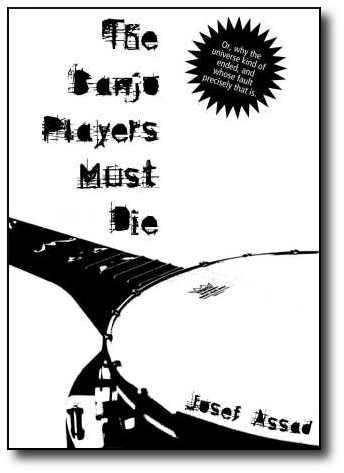Empfehlung: Josef Assad, "The Banjo Players Must Die"
 Diese Buchempfehlung könnte fast als "Gratis = Nix Wert IV" durchgehen, denn der erste Roman des 32-jährigen Dänen Josef Assad ist gratis. Wie Cory Doctorow und viele andere stellt der Autor sein Buch unter einer CC-Lizenz gratis zum Download in verschiedensten Formaten zur Verfügung. Was jetzt (mir) noch dazu fehlt, ist eine bequeme tragbare Möglichkeit, das Ding wie ein Taschenbuch mitzunehmen, aber so mancher iPod und viele Handys, von PDAs ganz zu schweigen, schaffen das locker. Wer will, kann natürlich auch am Monitor lesen oder das Ding ausdrucken.
Diese Buchempfehlung könnte fast als "Gratis = Nix Wert IV" durchgehen, denn der erste Roman des 32-jährigen Dänen Josef Assad ist gratis. Wie Cory Doctorow und viele andere stellt der Autor sein Buch unter einer CC-Lizenz gratis zum Download in verschiedensten Formaten zur Verfügung. Was jetzt (mir) noch dazu fehlt, ist eine bequeme tragbare Möglichkeit, das Ding wie ein Taschenbuch mitzunehmen, aber so mancher iPod und viele Handys, von PDAs ganz zu schweigen, schaffen das locker. Wer will, kann natürlich auch am Monitor lesen oder das Ding ausdrucken.
Downloaden kann man das Buch hier oder aber zB bei manybooks.net - da gibts noch mehrere literarische Großtaten für lau. Man kann aber auch einfach das Ding ganz ohne Download im Browser lesen - hier .
Zum Buch selber: ein Riesenspaß für Menschen mit bizarrem Sinn für Humor. Ja, hier werden Hamster sexuell belästigt, der Weltuntergang findet statt, Engel kommen auch vor und sind so seltsam und pervers, wie man das von unsterblichen androgynen Wesen erwarten kann. Das alles spielt im 25 . Jahrhundert und passiert im Stil von Douglas Adams oder Terry Pratchett (die Fußnoten!), mit der Scheißmirnix-Attitüde eines Chuck Palahniuk und der ausschweifenden Rundumschau eines Mini-Pynchon. Mit anderen Worten: Manche werden es lieben, andere werden ungläubig die Augen verdrehen. Gut so.
Wer sonst noch Anhaltspunkte braucht: So viel Spaß hatte ich nicht seit Steven Wells ' fantastischem, gänzlich obskurem Meisterwerk "Tits-out Teenage Terror Totty" . Ja, das Buch gibt's wirklich.
Eine Leseprobe aus "The Banjo Players Must Die" gibt's beim Weiterlesen .
----------------------------------------------------------------------------------------------------
Without political strife, it got boring quickly. Religious strife wasn’t an option either, since it had pretty much been done to death by the Semitic peoples in the Middle East; religious conflict as an art-form had been perfected there and had been laid to rest complete. And, truth to tell, one couldn’t simply have plain old strife, it had to have a qualifying adjective of suitable character to validate it and lend it gravitas.
For once, humanity was at a genuine loss for something worthwhile to kill each other over.
They tried out botanical strife in Guatemala, but there was something about fighting over palm fronds which smothered enthusiasm. Boustrophedonic strife erupted briefly in Canada but petered out quickly amidst angry cries for new types of strife with more pronounceable names. The University of Two Goats, Arizona produced a paper proposing typographical strife, but the idea failed to imprint itself outside the limited circulation of academic journals. A Belgian priest – finding that his profession could not survive without people killing each other in large numbers over trivial differences of opinion – proposed that we change the way strife is spelled to stryphe, thereby enabling people to engage in ethnic stryphe without the feeling that they are reinventing the wheel. This triggered a violent bout of semantic strife which did not die down until Father Manicurus was dispatched to the aphterlyphe. The southern German province of Bavaria experienced some ethnic strife in the early twenty-first century, and it was quickly reprimanded by its neighboring countries for its manifest lack of originality.
- Anmelden um Kommentare zu schreiben
